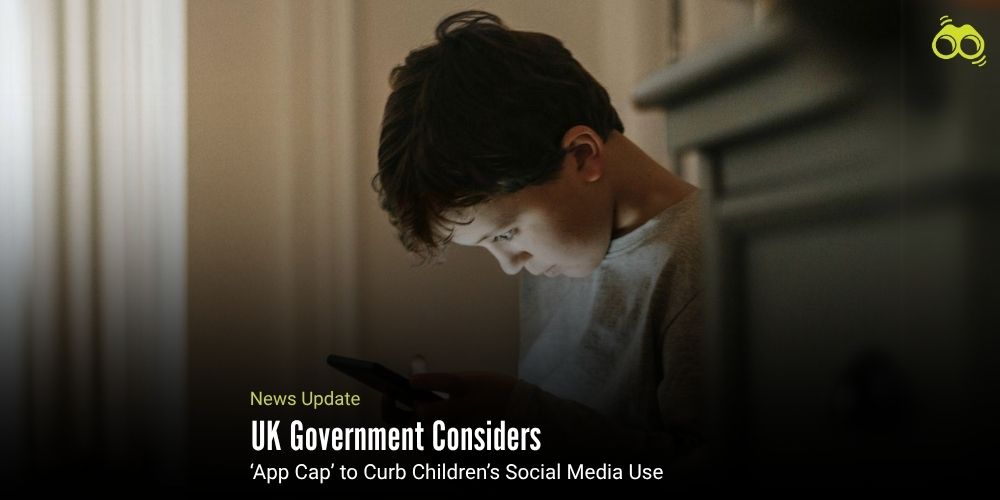
International Policy
 New Regulations May Introduce App Caps and Screen Time Restrictions for Young Users
New Regulations May Introduce App Caps and Screen Time Restrictions for Young Users
Technology Secretary Peter Kyle Explores Limits on Children's Social Media Usage
|
Jun 10, 2025 |
Social media plays a vital role in children's lives, offering opportunities for connection and self-expression. However, despite its benefits, excessive use can pose significant risks, particularly concerning mental health and well-being. Reports indicate that problematic social media use among adolescents has increased from 7% in 2018 to 11% in 2022, with girls (13%) being more affected than boys (9%). This upward trend is worrying, as prolonged screen time has been linked to anxiety, sleep disturbances, and lower social well-being.
In response to growing concerns, the UK government is reportedly considering new measures to regulate children's social media usage to prevent addiction and encourage responsible digital habits. Technology Secretary Peter Kyle has suggested that his department is exploring strategies such as “app caps” and curfews, aiming to limit excessive screen time among young people. Among the proposals under review are restrictions on daily usage, including a potential two-hour limit per day, as well as measures to block access during school hours or after 10 pm. These initiatives highlight increasing worries about the effects of social media on children's mental health and academic performance, prompting policymakers to seek solutions that ensure a safer digital environment.
Kyle recently stated that officials are evaluating ways to shield children from the harmful effects of excessive technology use. Proposed measures include a two-hour daily limit on social media apps and restrictions on access during key times. Additionally, he noted that the current review process is focused on curbing addictive smartphone and app behaviours that negatively impact children's well-being. Further reinforcing these concerns, Kyle emphasised the importance of online safety and suggested that the Online Safety Act could be strengthened to provide better protections. From July onwards, platforms will be required to provide age-appropriate content, failing which they could face criminal penalties. He also stressed that safety measures should help define a healthy online experience for children, similar to how society shapes physical health. While ruling out a complete social media ban for under-16s, he stated that all possible options remain open to safeguard children online.
Meanwhile, Labour MP Josh MacAlister had initially proposed raising the digital age of consent from 13 to 16, but following ministerial opposition, his bill was revised to call for further research rather than immediate changes. This legislative shift coincides with findings from a survey conducted for the Children’s Commissioner, which revealed that 23% of children aged 8 to 15 spend more than four hours per day on internet-enabled devices. Additionally, 25% reported two to three hours of daily use, while 20% reported three to four hours, reinforcing concerns about excessive screen time.
Alongside Kyle's proposals, Education Secretary Bridget Phillipson has been reviewing smartphone bans in some English schools. The National Education Union has supported these efforts, citing mounting concerns over the impact of social media on young people. Current guidance advises schools to restrict phone use throughout the school day, though enforcement remains at the discretion of individual institutions. Meanwhile, a parental movement, Smartphone Free Childhood, has launched a “parent pact”, urging families to delay smartphones until the end of Year 9 and restrict social media access until age 16.
As social media continues to shape the lives of young users, policymakers are under increasing pressure to introduce safeguards that promote responsible usage while mitigating risks associated with addiction and digital dependency. The government's approach to regulation will likely play a crucial role in defining the future of children's online experiences. While social media is an essential tool for modern communication and learning, its unchecked use presents serious risks, making regulatory measures necessary to ensure children's well-being.
Editor’s Note:
The UK government's initiative to regulate children's social media usage is a significant step towards addressing concerns about excessive screen time and its impact on mental health. By introducing measures such as app caps and curfews, policymakers aim to reduce addiction-like behaviours and encourage healthier digital habits. These restrictions, including limiting daily usage to two hours and blocking access during school hours or late at night, could help children develop a more balanced relationship with technology. While these efforts focus on safeguarding young users, they also highlight the broader challenge of ensuring that social media remains a tool for learning and connection rather than a source of harm. Other countries are also taking action to regulate social media for children. Australia, for instance, has approved a ban on social media for under-16s, enforcing strict penalties for platforms that fail to comply. France has introduced laws requiring age verification and parental consent for users under 15, while Germany mandates parental approval for children aged 13 to 16.
According to Skoobuzz, parents and educators should guide children toward positive social media use by encouraging productive activities. Rather than complete bans, focus should be on directing children to learn new skills, participate in constructive discussions, and consume inspiring content online.
Skoobuzz
View More News(2028)
0 Comments (Please Login To Continue)